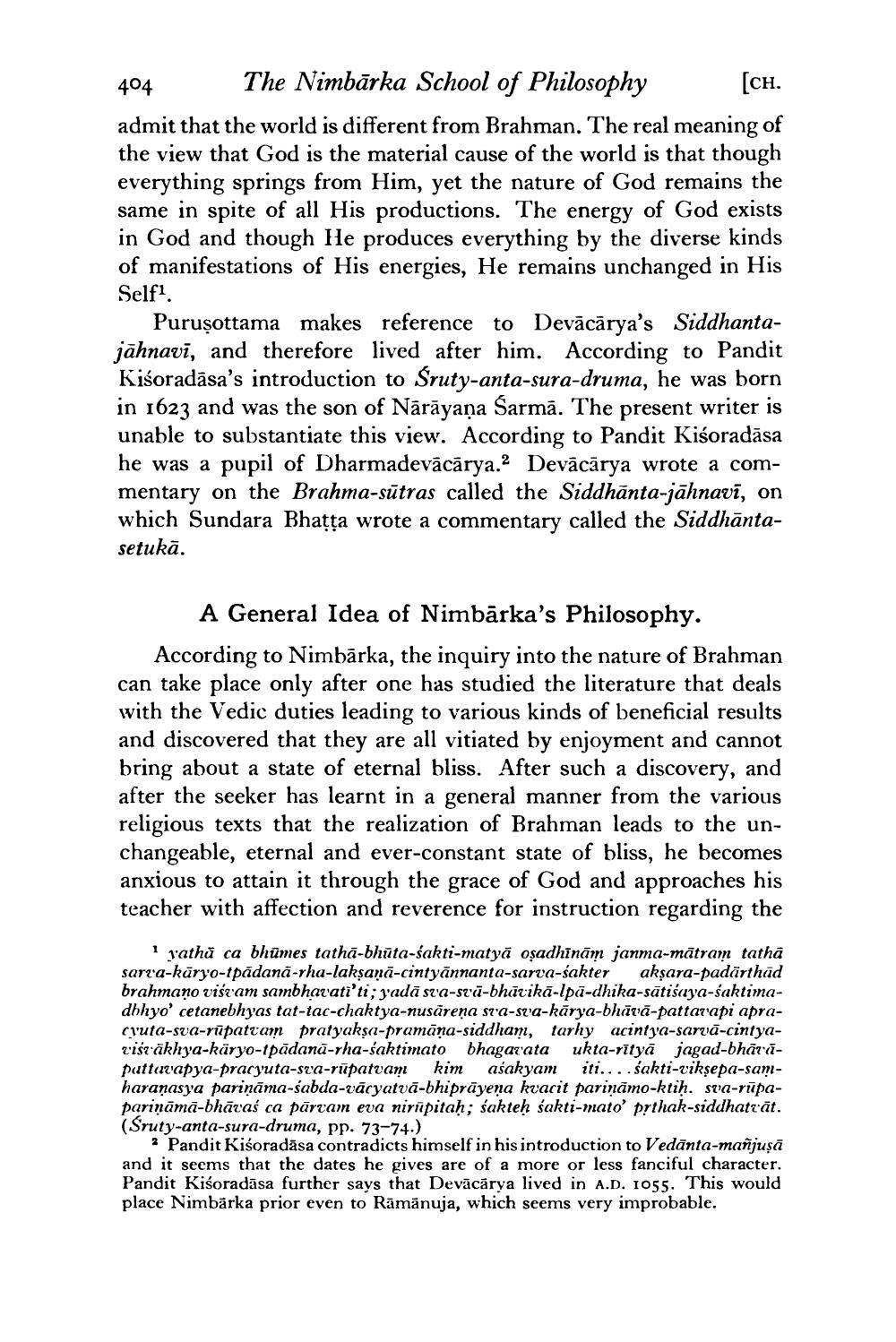________________
404
The Nimbarka School of Philosophy
[CH.
admit that the world is different from Brahman. The real meaning of the view that God is the material cause of the world is that though everything springs from Him, yet the nature of God remains the same in spite of all His productions. The energy of God exists in God and though He produces everything by the diverse kinds of manifestations of His energies, He remains unchanged in His Self1.
Purusottama makes reference to Devācārya's Siddhantajāhnavi, and therefore lived after him. According to Pandit Kiśoradāsa's introduction to Śruty-anta-sura-druma, he was born in 1623 and was the son of Nārāyaṇa Šarmā. The present writer is unable to substantiate this view. According to Pandit Kiśoradāsa he was a pupil of Dharmadevācārya.2 Devācārya wrote a commentary on the Brahma-sūtras called the Siddhānta-jāhnavī, on which Sundara Bhaṭṭa wrote a commentary called the Siddhantasetukā.
A General Idea of Nimbārka's Philosophy.
According to Nimbārka, the inquiry into the nature of Brahman can take place only after one has studied the literature that deals with the Vedic duties leading to various kinds of beneficial results and discovered that they are all vitiated by enjoyment and cannot bring about a state of eternal bliss. After such a discovery, and after the seeker has learnt in a general manner from the various religious texts that the realization of Brahman leads to the unchangeable, eternal and ever-constant state of bliss, he becomes anxious to attain it through the grace of God and approaches his teacher with affection and reverence for instruction regarding the
1yatha ca bhūmes tathā-bhūta-śakti-matyā oṣadhīnām janma-mātram tathā sarva-kāryo-tpādanā-rha-lakṣaṇā-cintyānnanta-sarva-sakter akṣara-padarthad brahmano viśvam sambhavati'ti; yadā sva-svā-bhāvikā-lpā-dhika-sātiśaya-śaktimadhhyo' cetanebhyas tat-tac-chaktya-nusāreņa sva-sva-kārya-bhāvā-pattavapi apracyuta-sva-rupatvam pratyakṣa-pramāṇa-siddham, tarhy acintya-sarva-cintyavistäkhya-karyo-tpādanā-rha-śaktimato bhagavata ukta-ritya jagad-bhāvāpattavapya-pracyuta-sva-rūpatvam kim aśakyam iti....śakti-vikṣepa-samharaṇasya pariņāma-śabda-vācyatvā-bhiprāyeṇa kvacit pariņāmo-ktiḥ. sva-rupapariņāmā-bhāvaś ca pārvam eva nirupitaḥ; śakteḥ śakti-mato' prthak-siddhatrāt. (Sruty-anta-sura-druma, pp. 73-74.)
2 Pandit Kiśoradāsa contradicts himself in his introduction to Vedānta-mañjuṣā and it seems that the dates he gives are of a more or less fanciful character. Pandit Kiśoradāsa further says that Devācārya lived in A.D. 1055. This would place Nimbārka prior even to Rāmānuja, which seems very improbable.




